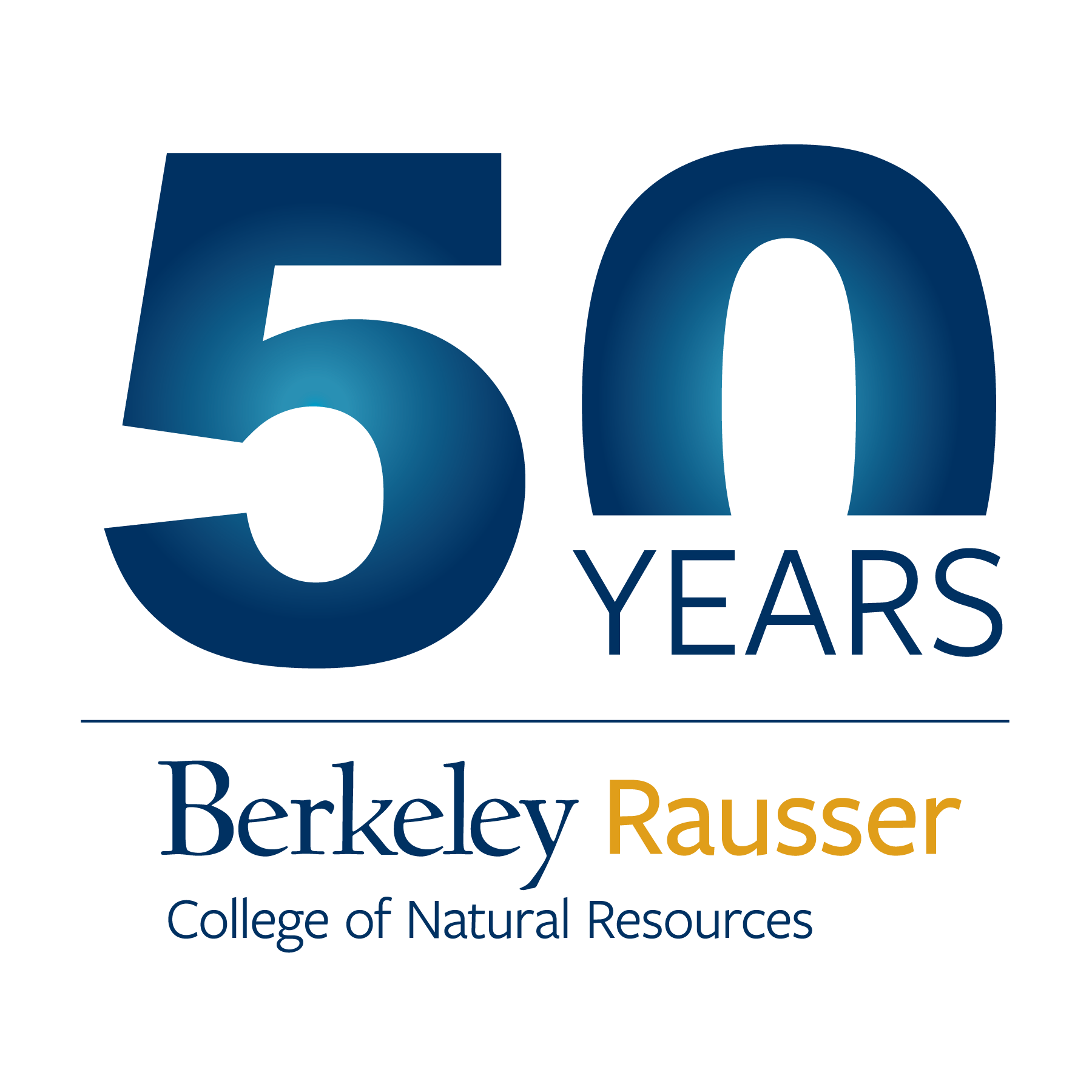
The Rausser College of Natural Resources is the first college in the UC system, dating back to the formation of the College of Agriculture in 1868, when the California legislature established the University of California in Berkeley, and the federal Morrill Act established a national system of research stations to foster teaching and research related to agriculture. UC Berkeley became the first state-run Agricultural Experiment Station and the first land-grant college in California.
In 1914, the College of Agriculture established a forestry program that included the study of forests and wildlands, along with their many resources and services, a program that eventually became the School of Forestry. As natural resource and environmental issues expanded beyond traditional farming and forestry, the College's mission also expanded. In 1974, the former agricultural and forestry schools joined with other environmental, biological, and food sciences units to form the College of Natural Resources.
In 2020, the College was renamed the Rausser College of Natural Resources in honor of a landmark $50 million gift by Gordon Rausser, former dean of the college and the Robert Gordon Sproul Distinguished Professor Emeritus of agricultural and resource economics at UC Berkeley. The gift was the largest donation ever received by the College and the largest naming gift of any academic unit at UC Berkeley at the time. More information on Gordon Rausser may be found here.
For more than 150 years, the college has focused on increasing society’s understanding of the earth and the environment, and how humans and nature interact. Learn about our academic offerings, our research and outreach, and our countless alumni making a difference.
Agriculture and natural resources have been a cornerstone of the University of California, Berkeley since its founding in 1868. Follow along as we chart Rausser College’s path from its earliest iterations to its present day status as a leader in public education, research, and outreach.
1862
Morrill Land Grant College Act passed, authorizing land grants to states that established colleges of agriculture and mining arts.
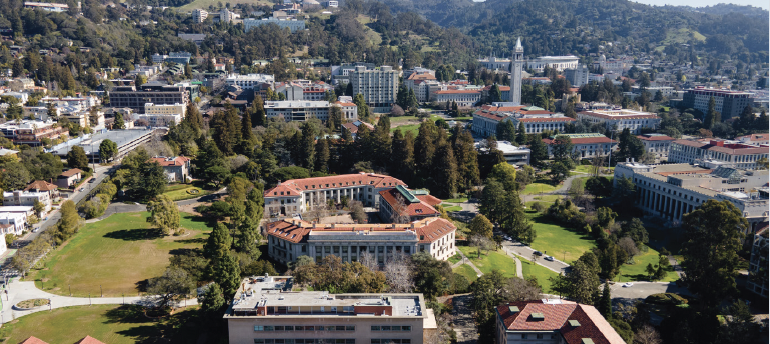
[image caption]
Advancing—and re-examining—UC Berkeley’s Land Grant Legacy
Rausser College of Natural Resources traces its roots back to the establishment of the University of California and the formation of the College of Agriculture in 1868. Supported by the federal Morrill Land-Grant Act of 1862, UC Berkeley became part of a national system of research stations to foster teaching and research related to agriculture. Rausser College continues UC Berkeley’s land grant mission through its biological, ecological, economic, and social science research, and through the long-standing tradition of UC Cooperative Extension work that directly benefits the people, agriculture, and natural resources of our state.
Rausser College also recognizes that the nearly 11 million acres of land sold through the Morrill Act were expropriated from Indigenous nations and communities. In 2020, Rausser College and other UC Berkeley organizations co-sponsored a two-part forum to examine the 150,000 acres of Indigenous land that funded the University of California. We remain committed to exploring our role in California’s unjust history of Native dispossession and how our research and outreach can address the University’s responsibility to California Indigenous communities.
1868
Organic Act established the University of California and the College of Agriculture, Rausser College's predecessor
1874
The university’s first female graduate, Rosa L. Scrivner, earned a degree in agriculture from the College of Agriculture

[image caption]
Celebrating more than 150 years of women at Berkeley
Throughout the history of the Rausser College of Natural Resources, women have contributed to its diverse and comprehensive research and discoveries, including many “firsts,” both within their respective fields and at Berkeley. In 1870, the UC Board of Regents resolved to admit women on the same basis as men. In 1874, the university’s first female graduate, Rosa L. Scrivner, earned a degree in agriculture from the College of Agriculture, Rausser College's predecessor. Since that time, Rausser College has continued to champion and support the work of women scientists and thinkers. In 2020, the campus came together for a yearlong celebration of 150 years of women at UC Berkeley.
1914
Division of Forestry is created
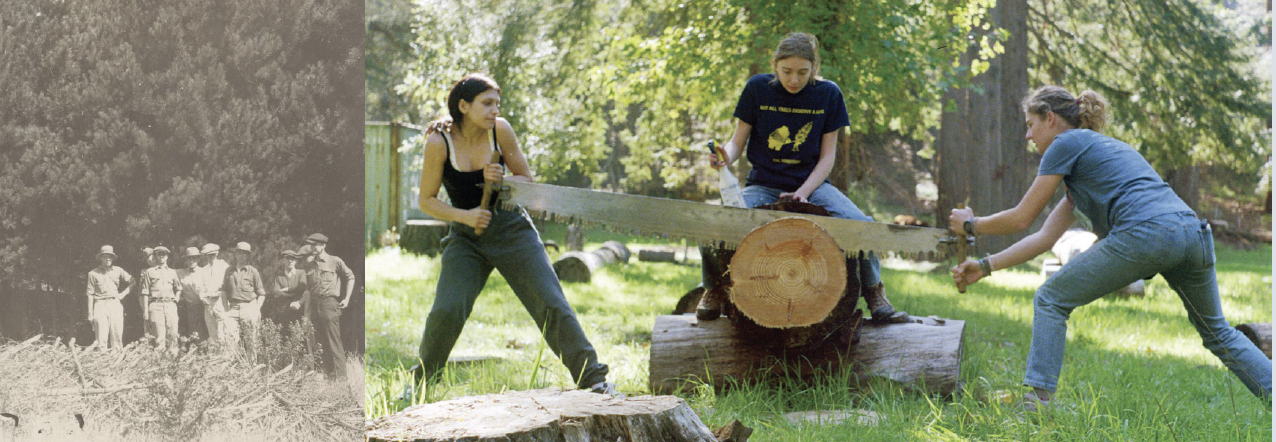
[image caption]
A century of Cal Forestry
The Cal Forestry program celebrated its centennial in 2014, marking 100 years of providing world-class forestry education and training to thousands of students. From its 1914 roots as the College of Agriculture’s forestry program to the 1974 merger that created the College of Natural Resources, forestry has been central to Rausser College’s mission of advancing innovative solutions for the benefit of society and the environment. Graduates of Berkeley’s forestry programs are key professionals in forestry and natural resource management at the state, federal, and international levels.
As anthropogenic climate change fuels widespread drought, major forest disturbance, and modern-day megafires, research and education remain critical to providing next-generation solutions to climate and conservation problems. Policymakers and land managers continue to seek out the expertise of UC Berkeley’s forestry students, staff, faculty, and alumni. Our program draws on decades of research across our forest properties and incorporates Traditional Ecological Knowledge about fire, demonstrating the need to re-evaluate and dramatically change forest management and wildfire mitigation strategies in California
1915
Meeting at the University of California, Berkeley to plan the country’s National Park Service, which was formally established the following year

[image caption]
America's Best Idea
In 1915 Stephen T. Mather, class of 1887, and Horace M. Albright, class of 1912, gathered a group at the young University of California Berkeley campus to plot a future for the country’s existing and evolving national parks. The result was legislation establishing the National Park Service in 1916. Mather became the first director of the park service, Albright was the second. UC Berkeley has been intimately involved with the parks ever since.
A century later, UC Berkeley convened science leaders for a summit to help launch a second century of stewardship for parks. The goal of the summit, “Science for Parks, Parks for Science,” was to envision and contribute to strategies for science in, about, and for using parks for the coming decades by building on the historic linkage between the National Park Service and scientists at leading universities and other organizations around the world.
In October 2017, the College of Natural Resources announced the establishment of the Institute for Parks, People, and Biodiversity, which works to tackle the most pressing issues facing the future of parks, including climate change and equitable access.
1928
Amadeo Peter Giannini donated $1.5 million to establish the Giannini Foundation and build Giannini Hall
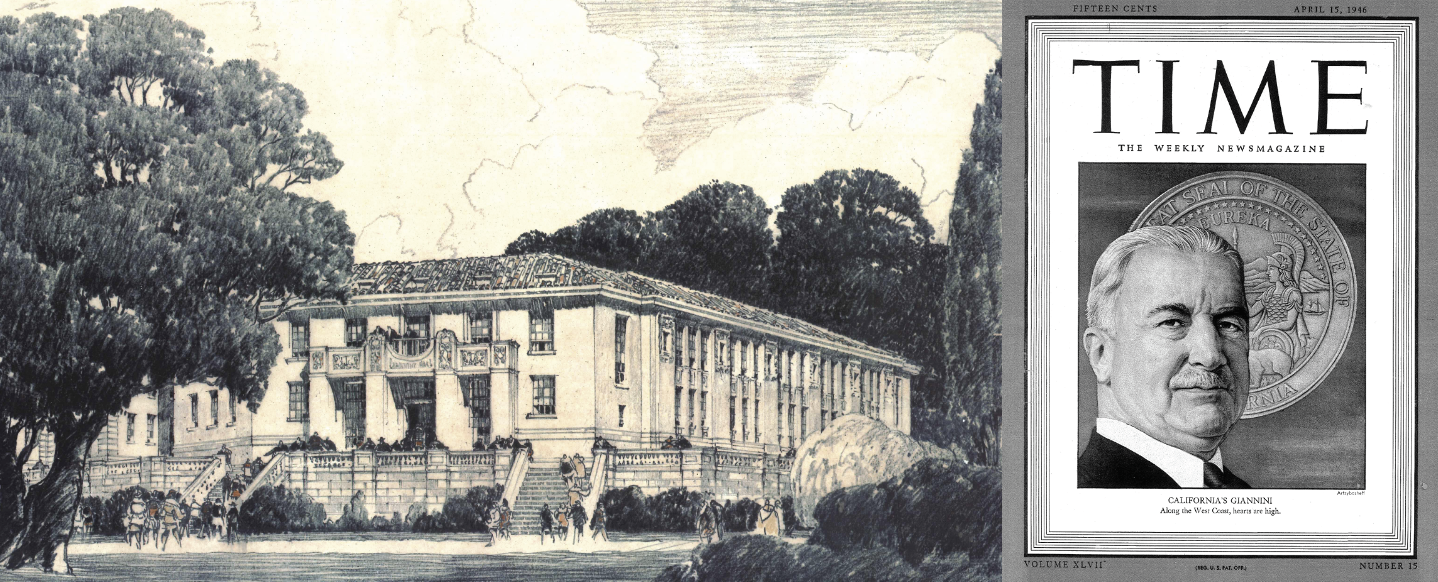
[image caption]
Historic Giannini Hall
Several of Rausser College’s departments and administrative units are housed in Giannini Hall, which is named in memory of Bank of America founder Amadeo Peter Giannini. His 1928 gift of $1.5 million to the University of California endowed the Giannini Foundation of Agriculture Economics and provided for the construction of Giannini Hall.
The building was designed by William Charles Hays, a professor of architecture who worked alongside famed UC Berkeley architect John Galen Howard. Giannini Hall was dedicated on October 21, 1930 as the final piece of UC Berkeley’s Agricultural Complex, which includes Wellman and Hilgard halls (also designed by Howard). All buildings in the Complex were added to the National Record of Historic Places in 1982.
1946
School of Forestry created
1974
College of Natural Resources is created
The merger of College of Agricultural Sciences and School of Forestry and Conservation established the College of Natural Resources, often known as CNR.
1992
College of Natural Resources reorganization
The College of Natural Resources was reorganized into four departments: Agriculture and Resource Economics; Environmental Science, Policy, and Management; Nutritional Sciences and Toxicology; and Plant Biology.
1996
Division of Microbial Biology established as part of the Department of Plant and Microbial Biology.
1998
Berkeley-Novartis Agreement Announced

A Model for Public-Private Partnerships
Established between UC Berkeley and Switzerland-based agricultural, pharmaceutical, and biotechnology firm Novartis in 1998, the Berkeley-Novartis Agreement brought Novartis’s significant financial, intellectual, and technological resources together with Berkeley’s strengths in plant genomics to advance research for the public good.
Agricultural and Resource Economics Professor and then-dean of the College Gordon Rausser provided the intellectual leadership for the agreement, which allowed faculty in the Department of Plant & Microbial Biology to pursue novel and innovative research. While it was controversial when announced, the deal was considered the most creative public-private research and development agreement of its time and it set the path for many beneficial subsequent partnerships at public universities.
2011
The Energy and Resources Group (ERG) joins the College of Natural Resources
2018
System-wide sesquicentennial celebration
The University of California system, University of California Berkeley, and the College of Natural Resources commemorate 150 years of excellence in education, research, and public service.
2020
College of Natural Resources renamed the Rausser College of Natural Resources
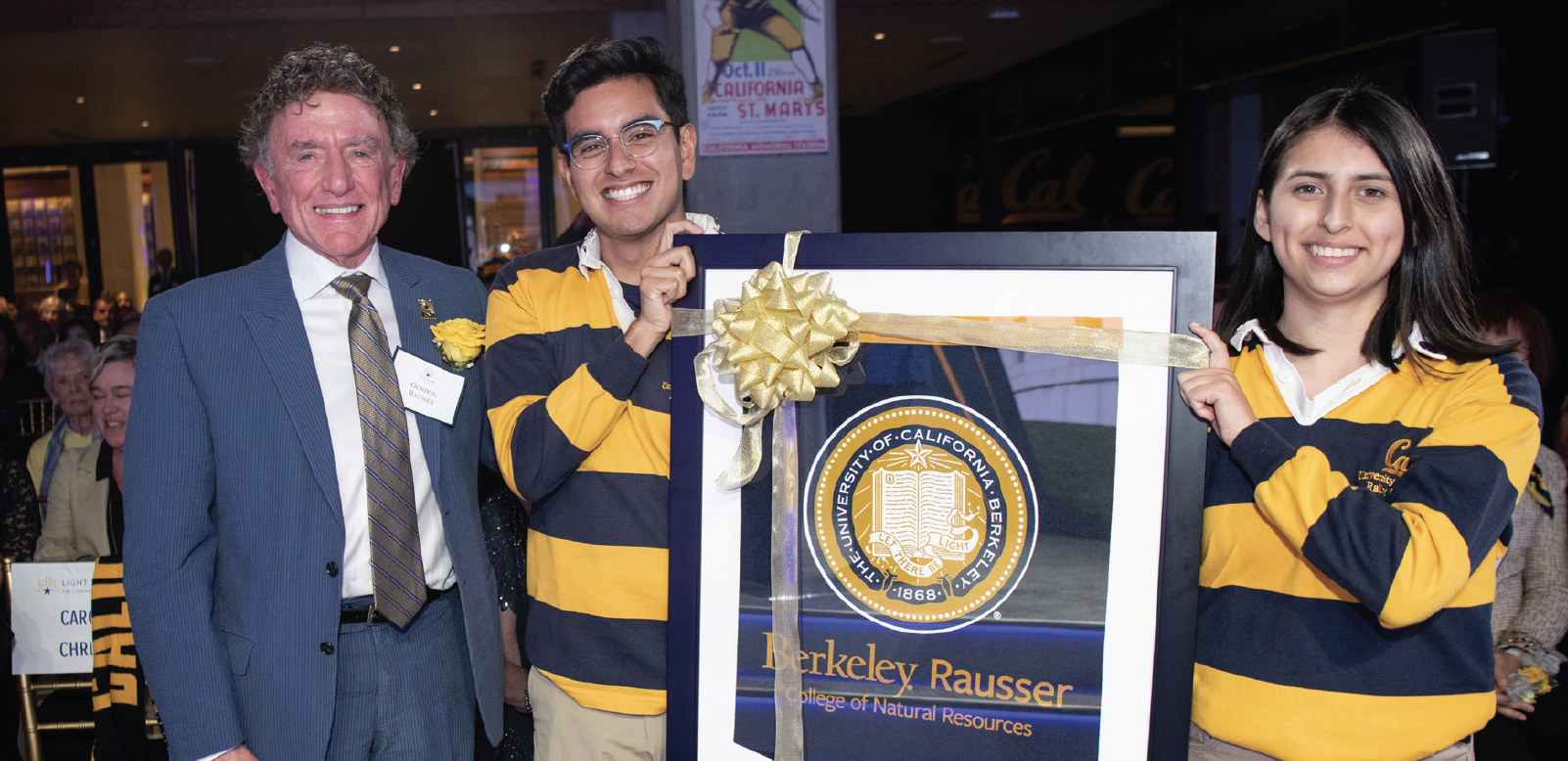
[image caption]
Gordon Rausser's Landmark Gift to the College
At the launch event for the UC Berkeley Light the Way campaign in February, 2020, Chancellor Carol Christ announced that the College of Natural Resources had been renamed the Rausser College of Natural Resources, in honor of a landmark $50 million gift by Gordon Rausser, former dean of the college and the Robert Gordon Sproul Distinguished Professor Emeritus of agricultural and resource economics at UC Berkeley. The gift, the largest donation ever received by the college and the largest naming gift of any academic unit at UC Berkeley at the time, supports the College’s mission to take on key economic, social, environmental and health challenges facing the state, the nation, and the world.
Rausser’s extraordinary gift established an unrestricted endowed fund through which the dean and future leadership can invest in core priorities to strengthen and enhance the excellence of the College. A portion of the gift also created an endowed fund for the UC Berkeley Master of Development Practice program and an endowed chair supporting a professorship in the Department of Agricultural and Resource Economics.
In a letter to campus, Executive Vice Chancellor and Provost Paul Alivisatos wrote: “Gordon is a proud product of California’s public education system. His incredible gift is inspired by his deep commitment to UC Berkeley, the College, and our shared public mission. He believes in the mission of the College and with this gift, has entrusted the College’s future leadership with resources to maintain our public character and remain highly competitive amongst our peer institutions.”
2024
Rausser College celebrates 50 years

[image caption]
Anniversary Events
Our 50th anniversary year will include a special issue of Breakthroughs magazine and special community, donor, and alumni events. Stay tuned in early 2024 for more details!

